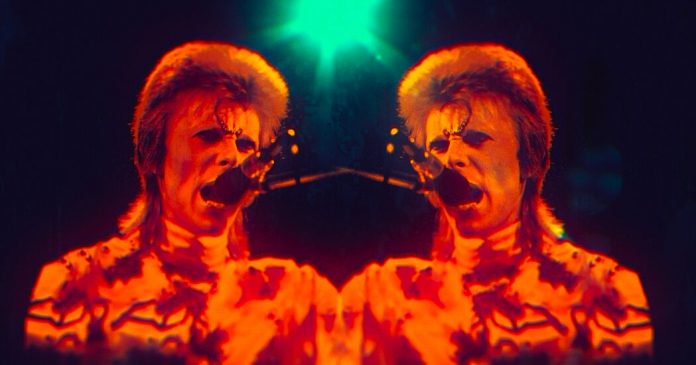The same old approach of constructing a documentary a few well-known, no-longer-living fashionable musician is to weave talking-head interviews (with colleagues, journalists and random celebrities with nothing higher to do) round video clips of the star onstage and within the studio. The story tends to comply with a regular script: early struggles adopted by triumph, catastrophe and redemption. Motion pictures like this clog the streaming platforms, catering to keen followers and nostalgic dads.
Brett Morgen’s new movie about David Bowie is one thing totally different. Titled “Moonage Daydream” after a semi-deep reduce from Bowie’s “The Rise and Fall of Ziggy Stardust and the Spiders From Mars,” and exhibiting in IMAX in addition to different codecs, it’s much less a biography than a séance. As a substitute of plodding by the chronology of Bowie’s life and profession, Morgen conjures the singer’s presence by an suave collage of live performance footage and different archival materials, together with function movies and music movies. There are loads of nice songs, and because of Morgen’s dexterous modifying, Bowie himself appears to supply the narration, a ghostly impact (he died in 2016) that resonates with a few of his concepts about time, consciousness and the universe. He’s not a lot the topic of the movie as its animating spirit.
“Does it matter? Do I trouble?” he asks initially, musing on the transience of existence. For anybody who grew up following the iterations of his persona and the evolution of his music, the reply, at the very least so far as the film is anxious, is emphatically sure.
Morgen, who has made documentaries concerning the Chicago 7, Kurt Cobain, Jane Goodall and the Hollywood producer Robert Evans, subordinates the dry information of historical past to the mysteries of character. “Moonage Daydream” is eager about what it felt wish to be David Bowie, and in addition, as a corollary, what it felt like, particularly within the Nineteen Seventies and ’80s, to be eager about him. Context and analysis — the sources and influences of his music; its relation to what was occurring within the wider world — are left to the viewer to provide or infer. The work, and the artist’s presence, are paramount.
For essentially the most half, this strategy works. Although Morgen bends and twists the timeline when it fits him, he traces an arc from the early ’70s into the ’90s, starting within the Ziggy Stardust years and immersing the viewers in Bowie’s otherworldly charisma at that second. His shiny orange hair, his brilliantly ingenious trend sense, his frank bisexuality and his nearly informal mastery of divergent musical idioms made him an irresistible puzzle for the media and an idol to the stressed and curious younger.
Showing onstage in clothes, flowing fits and glossy area gear, he undid gender conventions with insouciant ease. He modified his look and his sound from one album to the subsequent, main critics to query his authenticity and interviewers to surprise about his true self.
That thriller appears extra simply solved now than it may need again then, and “Moonage Daydream” explains a few of Bowie’s course of and loads of his pondering. The mixed impact of the present-tense voice-over and the sooner interviews is to emphasise Bowie’s important sanity. Maybe greater than most of his friends, he appears to have approached even excesses and transgressions with a sure mental detachment, taking an Apollonian perspective on an primarily Dionysian type.
His postwar childhood is handled shortly. He notes the coldness of his dad and mom’ marriage, and the affect of his older half brother, Terry Burns, who launched younger David to jazz, outlaw literature and fashionable artwork. Primarily, although, “Moonage Daydream” tacks away from Bowie’s private life, modifying intercourse and medicines out of its model of rock n roll.
His first marriage, to Angie Barnett, isn’t talked about in any respect. His second, to Iman, marks a transition from stressed solitude to contented center age. The emphasis, in each the narration and the photographs, is on Bowie’s work. His explanations of modifications in fashion and style are illuminating, and illustrated by shrewd musical choices. You don’t hear all the plain hits — the place was “Younger Individuals”? — however you do get a way of his vary and inventiveness, and a style of some less-well-remembered songs. I used to be glad to be reminded of the anthemic “Rock ’n’ Roll With Me.”
Watching Bowie transfer by the phases of his profession, from the avant-garde to the unapologetically pop, it’s clear, at the very least looking back, that his artistic life was a sequence of experiments in a formidable number of media. Morgen devotes a while to Bowie’s portray and sculpture, and to his appearing, in movies like “The Man Who Fell to Earth” and “Merry Christmas, Mr. Lawrence” and in a Broadway manufacturing of “The Elephant Man.”
Bowie was a fairly good actor, and in addition — that is proven slightly than stated — an exceptionally good dancer. His devotion to his work, and the pleasure he took in it, are the themes of “Moonage Daydream.” It’s a portrait of the artist as a considerate, fortunate man. And maybe surprisingly, given the mythology that surrounds so a lot of his contemporaries, a contented one.
Moonage Daydream
Rated PG-13. Rock ’n’ roll, the best way it was. Working time: 2 hours quarter-hour. In theaters.


